MISSING THE POINT
It’s not every day that a big Hollywood composer tells you that you’re missing the point when it comes to soundtrack reviewing. Not about a certain aspect of your reviews, but the whole thing. That we – this is not a personal thing – are missing the point by reviewing the soundtrack in the first place.
This, by the way, was David Arnold (of James Bond and Independence Day fame), who stated in no uncertain terms that he felt there was little point to reviewing soundtracks as their own thing and said we might as well be reviewing costumes. It’s not the easiest thing to take when someone of his stature says that, even as part of a fairly lively debate on Twitter, the catalyst of which was a “discussion” over the sound of Lorne Balfe’s score to Mission: Impossible – Fallout. The idea that this left me with a sense of ennui sounds mental, but it’s true, although an important footnote is that I do suffer from depression anyway.
It kind of felt like the episode of The Simpsons when Homer eats the deadly blowfish and runs through the five stages of grief in about thirty seconds. “Shut it Arnold, you’re wrong!”, “Independence Day wasn’t that good anyway!”, “Look I’ll give you five stars if you change your mind”, “For fuck’s sake…”, and “Oh well, it’s what he thinks.” And it is what he thinks, which is fine. It’s certainly an informed opinion because, well, he’s the expert. I’m just a guy who writes about these things.
So let’s talk about what I do for a second. I’m not going to go deep into the process or anything, but the first thing I like to make sure readers are aware of is that it’s a rarity that I’ve seen the film the soundtrack I’m reviewing belongs to. That undoubtedly seems odd to some people, including Mr Arnold, but there are multiple reasons, of which first of all is access. I live in South Wales so I am never invited to any kind of press screenings (and any inquiries into local media have been met with silence), and with certain life situations I can’t afford to go to the cinema a lot. Along with that, soundtracks are generally released before the film, so when I actually listen to them and look at reviewing them it’s likely I won’t be able to see the film anyway, especially as a fair few are from overseas titles like Ant-Man and The Wasp, which was held back over here due to the popularity of football in this country and the World Cup.
I’ll stress as well that labels and PR send the albums to me/us, but even with that it’s still difficult to manage to see anything unless there’s a screener available, which are scarce enough as the studios are still obsessed with piracy. So looking at the soundtrack itself and the important thing – context. The context is obviously the film itself, so by taking the music away from that you are completely stripping it of context and relevance, right?
Well, no, I don’t think so. Now I don’t think for one second that composers should be concentrating on anything but supporting the film, so I’ll nip that suggestion in the bud as there’s been a bit of confusion. However, there appears to be a split philosophy in regards to how the soundtrack is approached, and that loaded phrase “the listening experience”. On one hand, you have composers that are interested in curating an album that is musically interesting as a record, while on the other there seem to be those that put the score on album as it is and leave it at that.
There are good and bad examples that can be dredged up about both philosophies. Many will become dewy-eyed with nostalgia at the memory of older soundtracks that were arranged not in film order but to supply a good listening experience, albeit at the demands of the formats of the time i.e., before CDs. The Star Wars double LP from 1977 is essentially four mini-suites that are their own little experiences, and I imagine there are some that want to bring back that kind of thing. Film and game composer Austin Wintory has said that he likes to re-record cues for the album and make it a really separate thing, Christopher Young did the same with his album for Sinister, the film of which featured a fractured dissonant horror score. But many of us can also recall when these albums missed out key cues that we loved from the film, with some of them still not being officially released.
David Arnold has stated that he prefers to go with film order and “an absence of boredom” as he irreverently stated on Twitter. Geoff Barrow is the same. I think Barrow and Ben Salisbury’s albums are certainly suited to this because of a certain narrative freedom and mood in their scores, and because of this they work perfectly on vinyl too. I think vinyl and its limitations did allow for a certain art of itself to take hold, and that is really down to time. Cliff Martinez has previously stated the perfect soundtrack length is around half an hour, and he produces pretty great albums, but something the digital format has allowed is longer and longer records.
And then there is the more crass factor: money. Soundtracks cost money, which goes up steadily depending on your format, so people want to know – and again, this comes up – if the listening experience on the album is worth it. They are a separate product, even if they are ostensibly a by-product of the film. And of course, this really comes down to someone’s personal taste, in this case mine. I’m not pushing any kind of facts here, just opinions, and maybe that’s the thing, that we don’t treat everything as stone-cold facts. But if this has taught me anything, it is that maybe I should have a further look at how I review soundtracks, and to their credit a composer has already been in touch to try and get me into a local preview screening. Maybe if this was seen as a larger issue this could change, but like most things on Twitter it’ll probably fade back into the ether. Let’s hope not.
NEW RELEASES
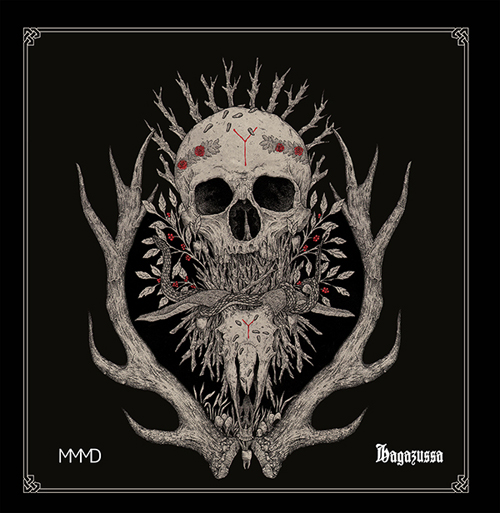
HAGAZUSSA – A HEATHEN’S CURSE (Antifrost, September 14). Didn’t see this one coming. A shot out of the dark, literally, and a journey into what has apparently been described as “chamber doom” with Greek duo MMMD (Mohammed) and their horror score. As much as I dislike these buzzword names, it’s not far off really: the immediate intro has slow scything strings and frequencies so low they practically drill underground like a contraption in a Jules Verne story and it stays like that, modulating and transforming but always hypnotic to the point of serenity. It’s such a rich soundscape, beautiful and sometimes distantly terrifying, like watching Bergman while the sound from the screen next door playing Suspiria bleeds through to conjugate. I’ve played it maybe four times today. It’s just thrilling.
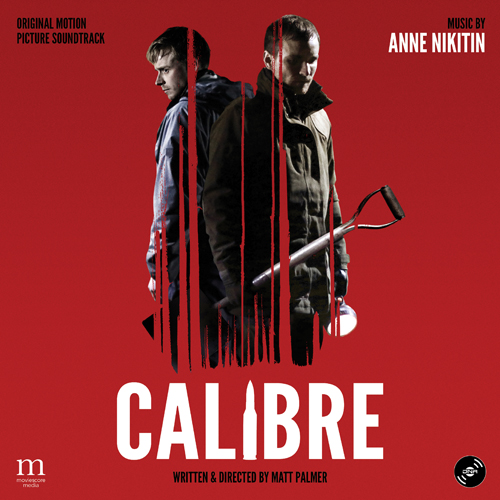
It’s amazing to see some smaller scores make inroads and Anne Nikitin’s score to the Netflix thriller CALIBRE (Moviescore Media, out now) certainly does that. Immediately catching you off-guard with some hauntingly beautiful strings that perhaps don’t feel like the gritty horror-like poster, the score steadily begins to splinter, first in some dissonant spikes during those amazing strings before coming in with some ambiguous tones and eerie vocal effects that are likely to make you pee yourself at least a little. Nikitin never loses sight of the melodic side of things and it’s a pleasantly paralysing experience, even if you might need a bit of a clean-up afterwards.
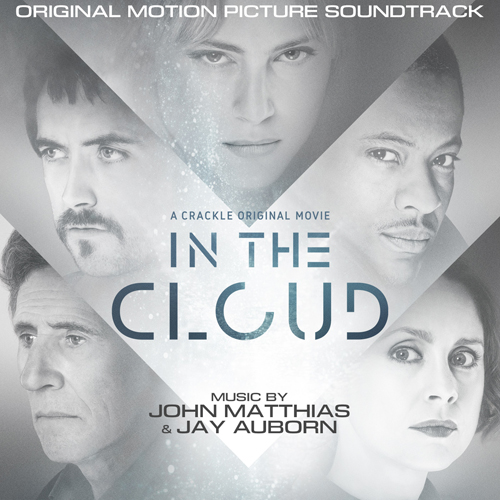
IN THE CLOUD (Madison Gate, out now) is a heady and energetic yet distorted vision for a science fiction thriller exploring the worlds of VR as memories, as composed by John Matthias and Jay Auborn with the help of Bristol’s chamber choir The Exultate Singers and the Vitosha Philharmonic Orchestra in Bulgaria. In The Cloud has a complex and fractured sound, flirting with gorgeous string melodies and piano and juxtaposing them with harsher electronic beats, including some thumping clubland pieces. Conceptually it wouldn’t be the same without some portentousness, which is underlaid by the haunting choir whose fusion with the crackling percussion is surprisingly wonderful.
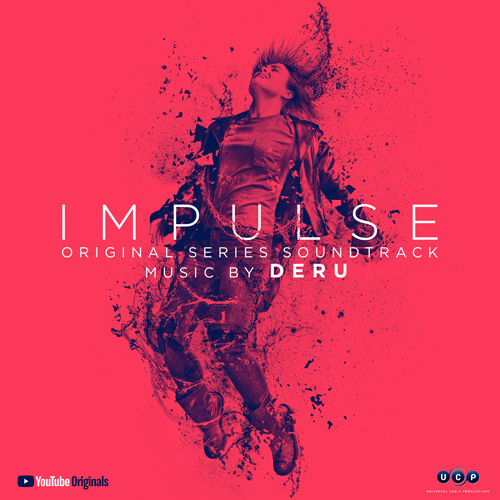
People complain about the scores of the Marvel Cinematic Universe but there’s very little to get angry about in ANT-MAN AND THE WASP (Disney Music, out now) with Christophe Beck happily bringing back his jazzy theme for Ant-Man as well as introducing an even more heroic line for Wasp, deftly combining the two. There are some weird elements brought into play including a strange pseudo-whalesong melody for the villain, and some great genre-bending providing both variety and excitement. IMPULSE (Lakeshore, out today) goes for the dark electronic science fiction thriller mood and mostly succeeds. Composer Deru constructs the score around the sound of the Cristal Baschet, a favourite of Cliff Martinez, and while it’s difficult to escape comparison with a similar ambient vibe, Deru does well to make the score consistently engaging and often quite beautiful.
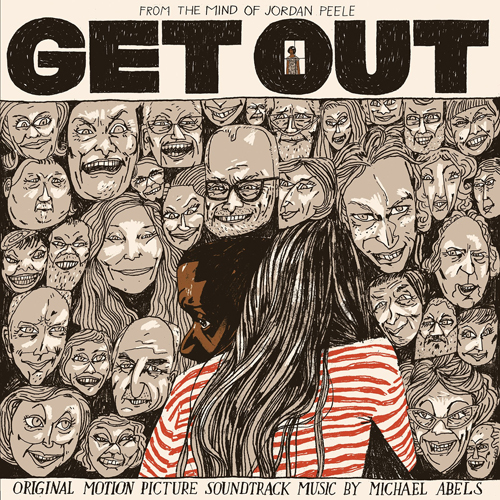
Speaking of beautiful, two incredible scores have just been issued on vinyl and are absolutely worth your time. Everyone is aware of what a spectacularly savage masterpiece Jordan Peele’s GET OUT (Waxwork, out now) is, and Michael Abel’s score is absolutely worth your time, opening with the eerie Swahili vocal and running from there, emphasising black voices and music as well as cutting a quite unsettling mood. His music for ‘The Sunken Place’ is especially affecting, using gospel voices to underline not only Chris’ situation but also the wider implications of what the family are doing, and to whom. Waxwork’s presentation is superb, with fantastically grotesque cover art by Leslie Herman and informative notes from Peele about the creation of the score. The record itself sounds fantastic. There’s such a wonderful (and apt) depth and it sounds terrifyingly encompassing at times, which is obviously Abels and Peele’s objective. Job Done.
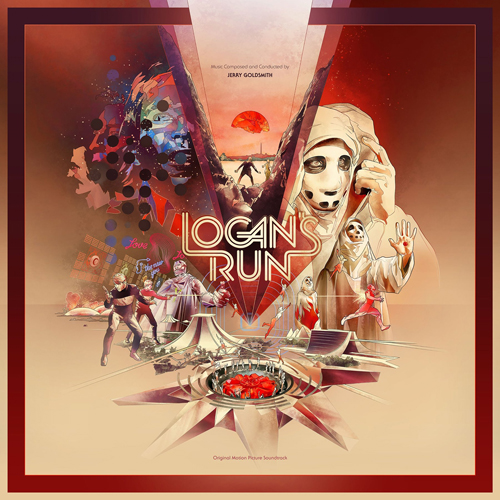
Jerry Goldsmith’s LOGAN’S RUN (Waxwork, out now) is another essential release and a great edition of one of Goldsmith’s many great science fiction scores. Not as famous as Star Trek or Alien, Logan’s Run nevertheless inhabits a lower tier of recognition along with his music for Capricorn One and Damnation Alley, two equally great scores. What’s really apparent here is Goldsmith’s love for electronics, and indeed the score begins with a thumping synth beat that wouldn’t be out of place in late 90s dance music along with classical synthetic sounds before they can be blended and developed with the orchestra to produce a unique soundscape for the world created for the film. It’s interesting how well it goes together with ,The Omen, which he scored in the same way, if you substitute the choral sections in that score for electronics. It’s just an amazing piece of work and Waxwork have done it justice with an incredible cover design by artist Martin Ansin, although they could have done with liner notes for such an important score – call me next time, yeah? The pressing sounds excellent, wonderfully clear although there are imperfections in the source material that may confuse, especially after listening to a modern recording like Get Out, but Waxwork have done a superb job.


